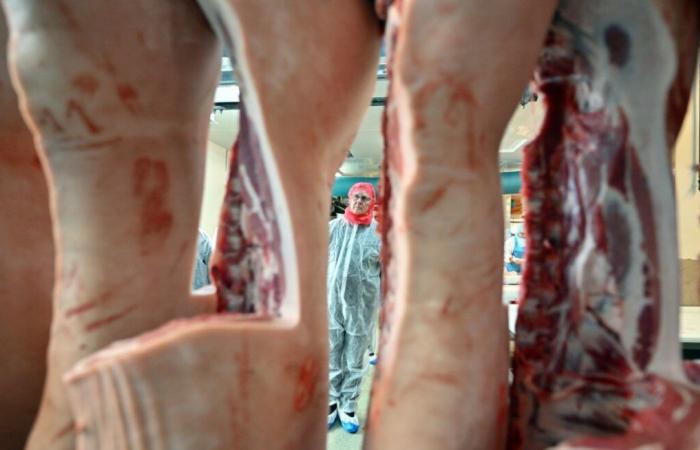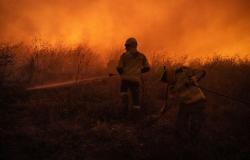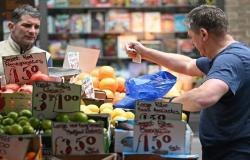Keystone/DPA/Martin Schutt
Can we still eat meat with a clear conscience, when it is accused of endangering health and the planet? Faced with criticism, the meat lobby, which Temps Présent investigated, defends itself with contested arguments, in particular to minimize the role of livestock farming in global warming.
This content was published on
September 18, 2024 – 11:00
First of all, who is this meat lobby? At first glance, only two parliamentarians are linked to the two main umbrella organizations of the sector: Proviande, which brings together large producers and distributors such as Migros or Coop, and the Swiss Professional Meat Union (UPSV), the more political arm of the meat sector.
But an investigation conducted by the Temps Présent program shows many more links of interest. Based on the data available online, we discovered a well-fed network, articulated between twenty-seven agricultural organizations and companies, particularly those linked to meat production, and sixteen parliamentarians. There are also indirect links with two other deputies.
10 billion in turnover
“Yes, the meat industry is well represented in Bern,” says Mike Egger, SVP National Councillor from St. Gallen, who is part of this network. He is also a project manager at Micarna (Migros). “I absolutely do not understand this demonisation of meat. It is a very healthy food, which contains important nutrients. And in Switzerland, agriculture, especially livestock farming, does an excellent job in terms of sustainability,” he adds.
The meat sector represents ten billion Swiss francs in turnover per year and thousands of jobs. Needless to say, Mike Egger is not thrilled by the Confederation’s new climate strategy, which aims to reduce meat production. Published in September 2023, it aims in particular to encourage our farmers to produce more plant-based proteins, via direct payments.
“We’re going to look at this strategy and review it,” Egger said. “We’re certainly going to debate it, but I’m confident that the demands of this strategy won’t have a big impact, because at the end of the day, we want productive agriculture. That’s what I’m committed to.”
The example of climate
The meat lobby has developed a hard-hitting communications strategy to downplay the role of livestock farming in climate change and question the conclusions of international experts.
He spreads his arguments through sponsored articles, such as a page published in Le Matin Dimanche, in which we can read that “the Intergovernmental Panel on Climate Change (IPCC) recently came to the conclusion that the current algorithm for calculating greenhouse gas emissions leads to a massive overestimation of the evolution of the planet’s temperature.”
“This time, we are clearly in the realm of disinformation, because we are faced with totally erroneous and even false facts,” denounces Valentine Python, climatologist and former national councilor (Greens/VD). “We are making a scientific organization, in this case the IPCC, claim statements that they did not make, not only, but we are also making them claim the exact opposite. So, we are clearly faced with scientific denial.”
Five million investment
In a video published on its website, the Swiss Farmers’ Union (USP) also highlights the conclusions of an American expert, Frank Mitloehner, a specialist in air quality, to minimize the role of livestock farming in global warming. However, this scientist is very close to the very powerful American meat industry.
“Over $5 million has been invested by the meat industry in the Clear Center research center that was set up for him at the University of California,” says Jennifer Jacquet, a professor of environmental policy at the University of Miami. “What I find very interesting is that he has no training in climate and he talks about Earth cycles, emissions and methane as if he were a greenhouse gas guru. His goal is to defend the meat and dairy industry.”
So why is this controversial expert featured in a USP video? “Listen, I can’t put myself in his shoes. I can’t judge the question of funding for this professor or anyone else,” replies Michel Darbellay, a member of the USP management.
“Today, we too often stigmatize livestock farming, and meat consumption as well. For us, it is important to re-establish the facts, to be able to rely on scientific foundations, to be able to take our responsibilities. We also relied on certain scientists who could guide us. And there is new knowledge at the international level to better assess the impact of methane on the climate.”
European projects slowed down
In Switzerland, a colleague of Frank Mitloehner also questions the impact of livestock farming on global warming. Peer Ederer, an agri-food consultant based in Rapperswil (SG), is one of the co-authors of the Dublin Declaration, an international appeal launched at the end of 2022 that defends animal farming to feed the planet. “A minority of scientists have imposed their anti-meat and anti-livestock farming positions,” says Peer Ederer.
“We believe that the majority of scientists do not agree with them. Through the Dublin Declaration, we have given them the opportunity to express their views on the fact that livestock farming has an important role to play in society. In all the major political capitals of the world, certainly in Brussels, certainly in Berlin, in Washington, in Canberra in Australia, the relevant ministries are all aware of the Dublin Declaration. It is a success,” the consultant continues.
“The declaration says absolutely nothing about the health, climate and environmental impacts,” says Camille Perrin, an agricultural policy specialist at BEUC, the leading European consumer organisation based in Brussels. “It has been used to create doubt around the existing consensus on the impacts of our meat consumption and to provide ammunition to politicians who wanted to oppose ambitious environmental strategies.” And indeed, the Declaration has contributed to the pausing or stopping of European projects aimed at reducing meat consumption.
In Switzerland, it is quite possible that the Confederation’s climate strategy will also bite the dust in parliament.
More
More
Want to know more? Subscribe to our newsletter
Subscribe to our newsletter for the Fifth Switzerland and receive our best articles in your inbox every day.
read more Want to know more? Subscribe to our newsletter







